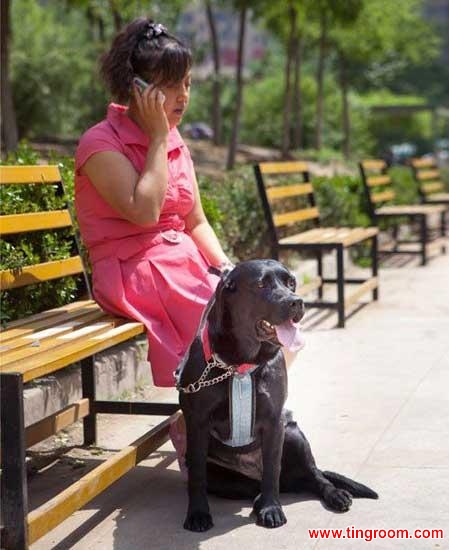-
(单词翻译:双击或拖选)
Beijing may finally allow guide dogs on public transport after the city approved a new draft of its Animal Epidemic1 Prevention Law. Currently, regulations in cities like Shenzhen and Chongqing allow people with visual disabilities to bring their guide dogs with them on buses and the metro2. But in the capital, the rules are still upheld, making it difficult for owners and their helpers.
 |
| Chen Yan and her guide dog Jenny. |
Beijing may finally allow guide dogs on public transport after the city
approved a new draft of its Animal Epidemic Prevention Law.
Chen Yan is a professional piano tuner. She says music is her life, but it wouldn’t have been much of a life without Jennifer, her guide dog.
Every day, the Labrador, helps Chen navigate3 her way around her community, safely through traffic and even to grab a bite. But there’s one place where Jennifer loses her professionalism at the subway.
"Every time they stop us from going in. They say pets cannot go in, even if they are guide dogs. When we tried this the 11th time, Jennifer just laid there and I knew she was crying." Chen said.
This time, with our TV crew, Chen thought things would go differently, but rules are rules.
"I haven’t got a notification saying guide dogs are allowed. If they notify me, I’m more than happy to have you on the subway." Beijing subway employee said.
And that’s despite objections from other passengers who say they have no problem riding with guide dogs.
In China, people are becoming increasingly familiar and comfortable with guide dogs. Surveys show that 16 million Chinese are blind or have visual impairments. But there are few guide dog organizations in the country, and only four to five helpers can be offered annually4. Meanwhile, more than 50,000 people apply for one of the highly trained canines5 every year. In the US, the first country in the world to train guide dogs, there are about 10,000 working right now, in China, just 50.
Also living in the capital city with her guide dog is paralympic gold medalist Ping Yali.
Just like Chen Yan, getting around the metropolis6 is a daily struggle.
And today, the bus driver just happened to be understanding enough to allow her and her gold retriever on.
"I’m so happy and luck today. But I think that luck has to do with your camera." Ping said.
Ping says one of the biggest fears people have is her guide dog may attack if it’s provoked. And she creates a scenario7 to show us that that will never happen.
Instead of getting in the fray8, all the golden retriever does is just pull its owner away.
For the visually impaired9 like Ping Yali and Chen Yan, their guide dogs are much more than pets. The dogs are faithful servants and friends. And they just want everyone else to see it the same way.
 收听单词发音
收听单词发音
1
epidemic

|
|
| n.流行病;盛行;adj.流行性的,流传极广的 | |
参考例句: |
|
|
|
2
metro

|
|
| n.地铁;adj.大都市的;(METRO)麦德隆(财富500强公司之一总部所在地德国,主要经营零售) | |
参考例句: |
|
|
|
3
navigate

|
|
| v.航行,飞行;导航,领航 | |
参考例句: |
|
|
|
4
annually

|
|
| adv.一年一次,每年 | |
参考例句: |
|
|
|
5
canines

|
|
| n.犬齿( canine的名词复数 );犬牙;犬科动物 | |
参考例句: |
|
|
|
6
metropolis

|
|
| n.首府;大城市 | |
参考例句: |
|
|
|
7
scenario

|
|
| n.剧本,脚本;概要 | |
参考例句: |
|
|
|
8
fray

|
|
| v.争吵;打斗;磨损,磨破;n.吵架;打斗 | |
参考例句: |
|
|
|
9
impaired

|
|
| adj.受损的;出毛病的;有(身体或智力)缺陷的v.损害,削弱( impair的过去式和过去分词 ) | |
参考例句: |
|
|
|

















